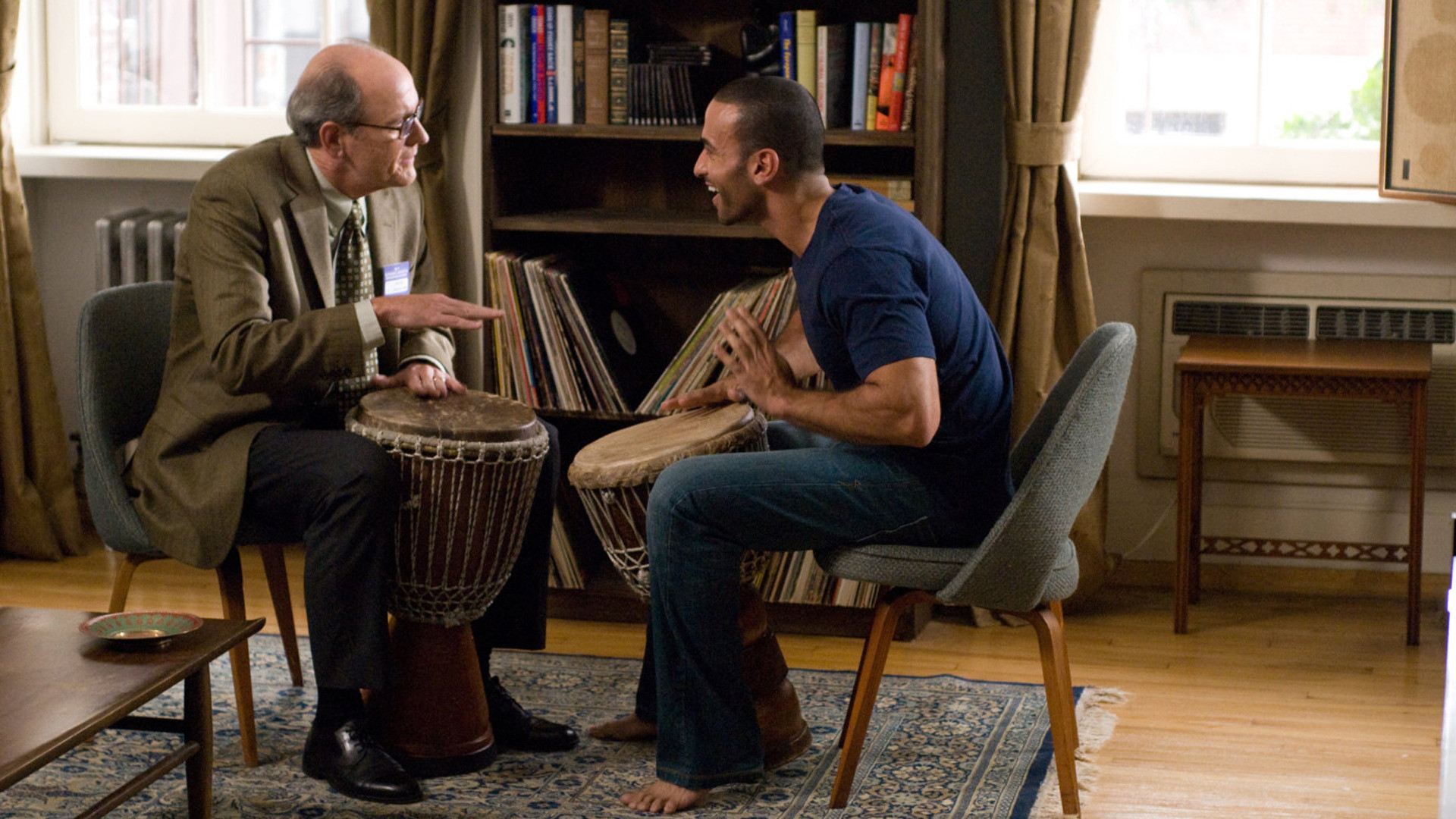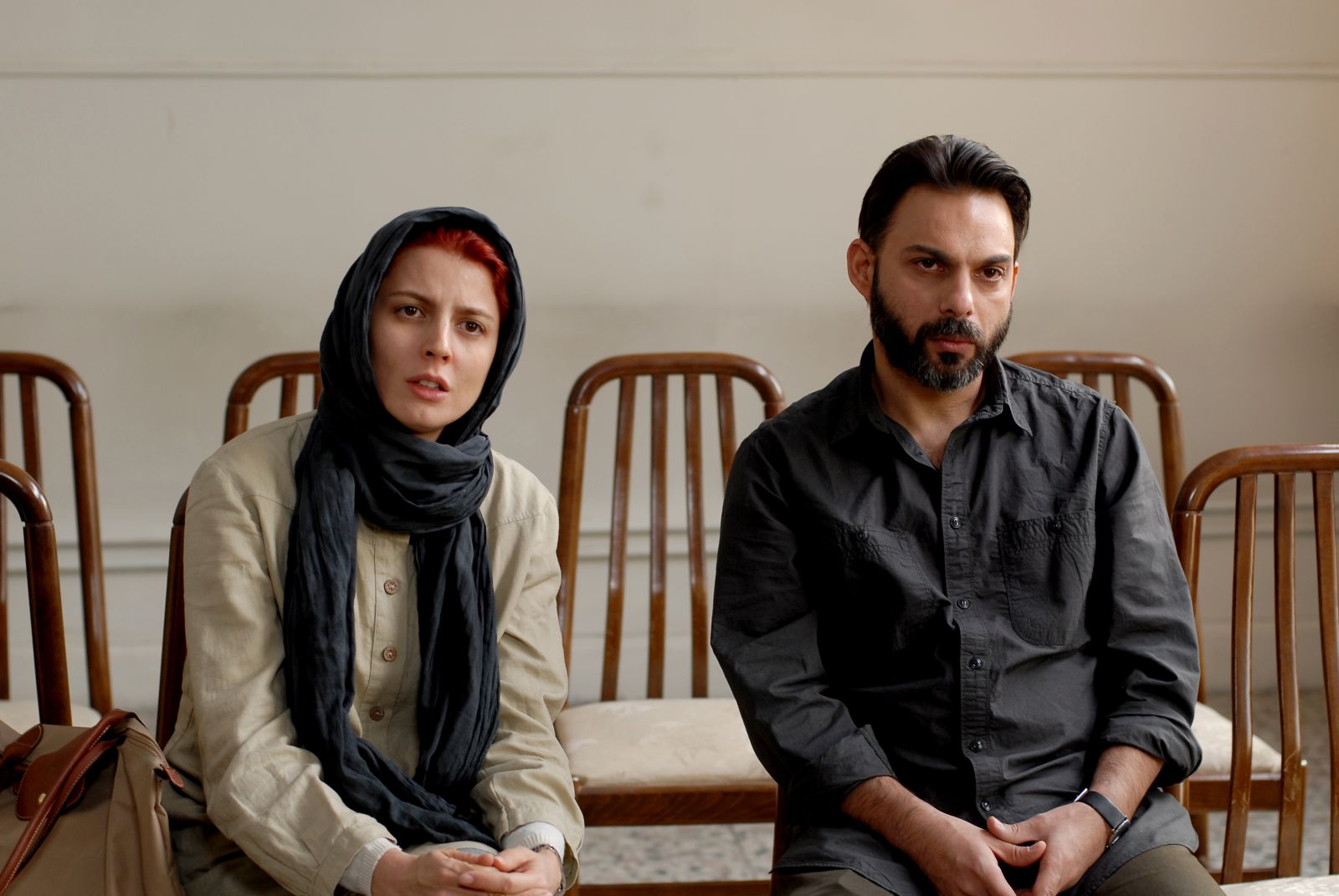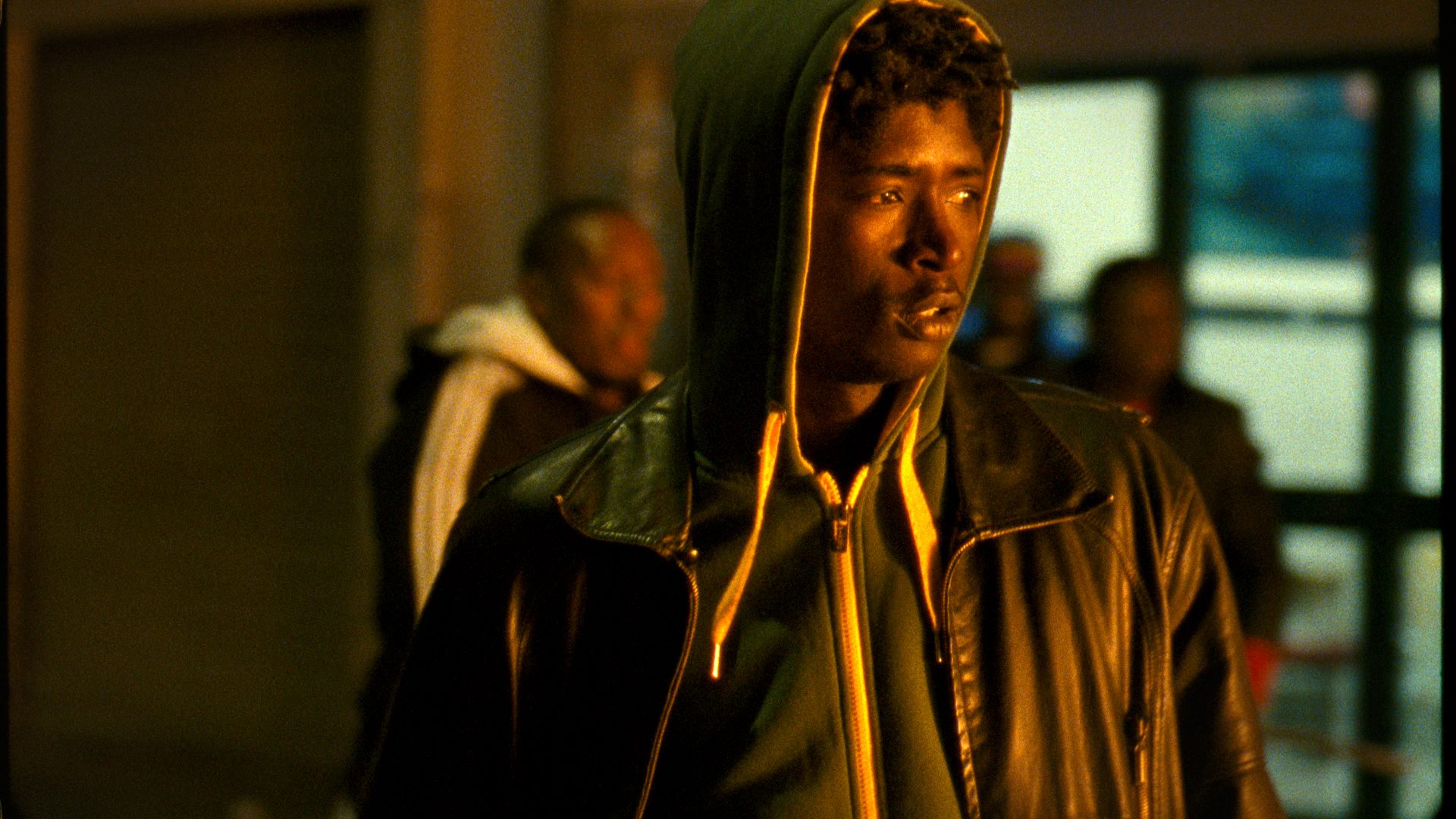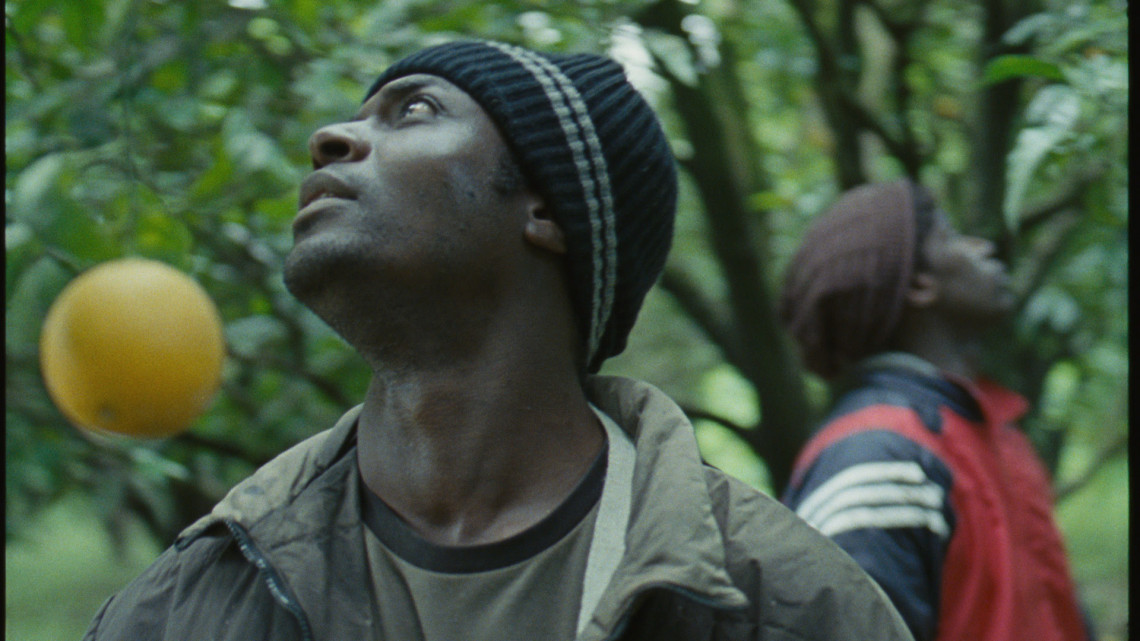There is a moment in Jonas Carpignano’s first feature Mediterranea (2015) when the sharp-eyed main character, Ayiva (Koudous Seihoun), finds a mouse racing across his bed and the floor, headed out of his shack. Before it can escape, Ayiva pounces on the rodent with a violent force fueled by a mix of fear and disgust. While the scene captures the refugee’s frustration with his living conditions, it’s also a metaphor for how so many citizens view immigrants. In the story, Ayiva is a refugee in Italy. In the metaphor, however, he’s the mouse, squeezing himself in through cracks in the wall, and stealing food like a filthy parasite. Mediterranea is a moving film about the modern predicament of exile.
Ayiva and his brother Abas (Alassane Sy) travel from Burkina Faso to Algeria, then to Libya, and finally to Italy. He leaves behind a daughter, hoping to set up a good life for her in a new home. The brothers travel as human contraband loaded up like cargo on overloaded trucks. They walk through desert, led by guides with questionable motives. They cross the Mediterranean Sea in a sputtering motorboat. Along the way, their fellow travelers die from the elements, powerful sea currents, and bullets.
While the likes of Steven Pinker (The Better Angels of Our Nature) and Jared Diamond (Guns, Germs, and Steel) argue that the world is getting less violent, the travel across nations for the dispossessed nevertheless remains as perilous as it has been in previous generations. Those with the privilege of traveling by plane with passports face the struggles of visa and customs. Those who lack such means smuggle themselves across borders.

Cinema has many refugee films, told either as road movies, fish-out-of-water films, or invasion stories. Mediterranea is strong as all three. Perhaps the best regarded of the road/fish-out-of-water movies is Gregory Nava’s El Norte (1983) about Guatemalans seeking to reach California. In contrast, Cheech Marin’s Born in East L.A. (1987) mocks nativist sentiments against a Mexican “invasion.” Vadim Perelman’s House of Sand and Fog (2003) also brings immigrants to L.A.–Iranians fleeing their country’s Islamic revolution–while Paul Haggis’ Crash (2004) mixes Iranian immigrants, Latinos, Cambodians, among others. Tom McCarthy’s The Visitor (2007) brings immigrants and refugees, including drummers, to New York City in a post-9/11 world. Paul Mazursky’s Moscow on the Hudson (1984) follows a Russian saxophonist (Robin Williams). Martin Scorsese’s Gangs of New York (2002) brings Irish immigrants to an unwelcoming city a century earlier. Ramin Bahrani’s Man Push Cart (2005) chronicles Pakistani immigrants lost beneath the skyscrapers in the same city.
Many of these films, and others, have an implicit colonial rhetoric: refugees from third-world countries seek safety in the West. For us, that perception isn’t questioned because it’s so plausible: we see ourselves as the world of civility, while looking at the rest of the globe as lands of pirates and barbarism. Mediterranea exploits this prejudice by giving an initial, false impression of Ayiva being a pedophile, through his developing relationship with his employer’s young daughter. Ayiva is intrigued by her mischievous spunk when she knocks down the fruit crates he’s moving. In the moment, we get a taste of the way elites–even children–might mock “the Help.” Later, Ayiva wants to purchase a set of headphones to give to a girl he is supposedly trying to seduce–we may think it’s the young daughter to our own disgust, but in a later scene we discover the headphones were for his own daughter, and his tale of bedding a girl was a lie to get a cheaper price.
One of the most respected American films, Casablanca (1942), is very much the story of refugees, seeking escape or asylum from political threats as well as from painful romantic memories. The film idealizes America in the same way that Ayiva idealizes the West. Many of our most beloved American films are stories about refugees because their migrations are part of larger stories. Vito Andolini leaves Italy, and arrives at Ellis Island years before he becomes Don Corleone. Antonio Raimundo arrives in the United States, going on to becoming Tony Montana. In both of those cases, theirs is a fight within the underworld, sometimes against officers of legitimate society. On the other hand, Kal-El, having escaped destruction in Krypton, saves the Earth a few times with his red cape and yellow Sun.

But world cinema offers a sobering perspective on how our idealized migration stories are a sheltered perception: not everyone moves to the West, not everyone wants to, and not everyone can. Consider Iranian films. In Asghar Farhadi’s A Separation (2012), a wife wants to divorce her husband because he refuses to migrate with her and their daughter to an undisclosed country; Western audiences commonly assume she seeks to move to a Western country. But Iranian films in particular explore a different geography than migration from East to West. Jafar Panahi’s The White Balloon (1995), Mohsen Makhmalbaf’s Kandahar (2001), and Majid Majidi’s Baran (2001) give attention to Afghans seeking either to escape their nation and/or to make a life in Iran. In the backdrop of Mike Nichols’ Charlie Wilson’s War (2007), Afghans live in enormous refugee camps in Pakistan, escaping the Soviet Occupation and subsequent Civil War.
Considering the codified immigration story we see in American cinema, nuance can be important in illuminating the different types of struggles people face based on their geopolitical and cultural circumstances. The difference between an immigrant and a refugee, for example, is quite important in today’s political discourse. Choice motivates the migrant, while need motivates the refugee. Syrians today seeking to escape the half-decade-long turmoil in their homelands are often viewed as migrants, seeking a free lunch in Europe. Now, after shootings in Paris, politicians frame Syrians a threat to law and order; in the case of leading presidential candidate Donald Trump, he’s gone as far as calling for border shutdown for all Muslim visitors, immigrants, refugees, and citizens, and has marched with his party-mates for some time now making similar calls about Mexicans. While it’s refreshing that members of his party are finally speaking out against him, his popularity indicates that many Americans take a xenophobic stance against visitors, recalling Bill the Butcher in Gangs of New York. But when borders are closed, refugees are left stranded. A lighthearted version of this predicament can be seen in Steven Spielberg’s The Terminal (2004), which was based on an unfortunately true story. A more serious version of this predicament was summed up in the famous, painful photo of Alan Kurdi, the three-year old Syrian/Kurdish boy whose body washed up onto the Mediterranean shores of Turkey.
In following Ayiva’s journey, Mediterranea reveals that the plight of the refugee is like a version of Maslowe’s Hierarchy of Needs. Throughout the film, we don’t know if Ayiva has a destination in mind. Is it a particular European country? Is it Libya? He’ll know it when he finally gets there, but he knows that where he is now, is definitely not it. In one scene he explains how to know if the travelers are going in the right direction. They pick a destination near the horizon, perhaps a large sand dune, and direct themselves toward it until they get there. Then, they point to another destination further toward the horizon, and head toward it. In other words, the first need for the refugee is a destination, albeit a temporary one.

The second need is in finding something to barter. While the world functions on cash or an electronic system, the refugee relies on commodities for currency–something to sell for profit. First Ayiva has shoes. Later he steals a suitcase and has an iPod media player. Later, he has a cell phone. Each succeeding product is more valuable. In buying and selling, not only is he able to find some food, but he starts developing a financial base that might one day fund his family’s arrival.
The third need is in finding legal residence by way of finding employment. Employment itself might provide funds. Because he works for an orange exporter, Ayiva gets eats to his fill (in citrus), satisfying another basic need. More importantly, employment provides the possibility of permanent residence. Though he might not yet have a home, if Ayiva can get official residency permits, he can work his way through everything else.
The fourth need, however, is in self-protection. In a sequence toward the film’s end, Ayiva and his fellow Africans are attacked by Italian Nativists. The characters in this moment pursue three different options: fight back, run away, or hide in sanctuaries provided by other natives. Because refugees don’t have a classification in the law, they can’t rely on law enforcement protection. That is simply not an option. They don’t have real homes, and what homes they do have are often tents or squatted apartments. Thus, they live in a realm of society that’s ignored, though fully populated, recalling the mouse who races through the shadows of a home.
But, what do we make of the last scene? Ayiva has decided to give up on Italy and return home. After so many tries, he’s finally able to talk to his family via Skype. As his daughter listens to Western pop music, he starts to cry. Perhaps the intensity of his travels has finally caught up to him. He sheds tears recalling the intensity of Tom Hanks’ breakdown at the end of Paul Greengrass’ Captain Phillips (2013), or young Sean Nelson at the end of Boaz Yakin’s Fresh (1994). Perhaps, Ayiva cries because he finally sees his daughter. All along, his whole purpose for his trek was to provide her with a better life.
Or, perhaps the answer lies in the Western pop music she dances to. He’s watched many travelers die in their attempts to join him on his road to the West. As he lived in the West, he was welcomed by a few and rejected by many. Now that he’s given up on any dream of living in the West, realizing that it wasn’t the Utopia he dreamt it to be, he watches his daughter becoming occupied by similar ideals of the West, presented through the superficial but powerful images of pop culture.

















